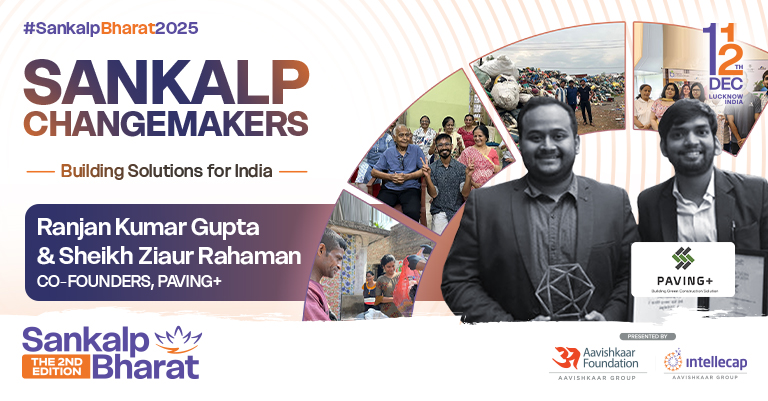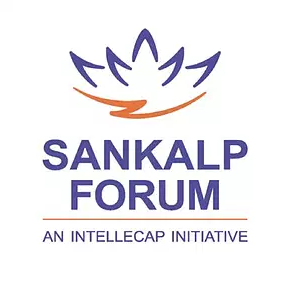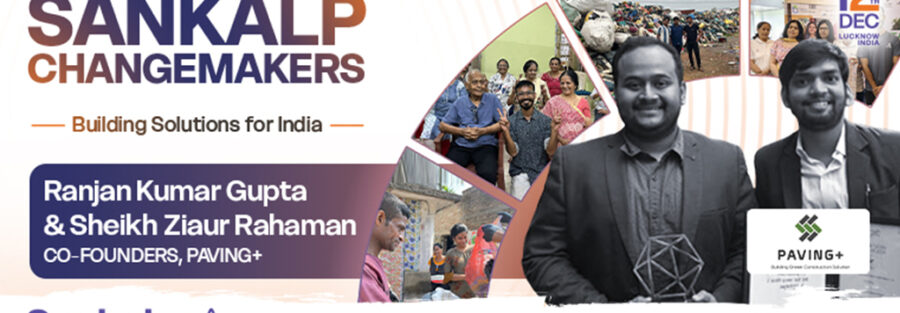

Every day, communities struggle with roads that crumble after a little rain and construction materials that don’t last. For Ranjan Kumar Gupta and his co-founder Sheikh Ziaur Rahaman, seeing these challenges firsthand was a call to action.
They decided to attempt to solve two problem with one solution with their start-up Paving+ in 2021: to turn a recurring problem, mixed waste, into better roads and buildings and pavements.
Paving+ entered the construction industry but with revolutionary approach – by using sustainable, high-quality materials procured from plastic waste. This re-cycled plastic was not only cost-effective but proved to be an ideal choice for modern construction needs.
And that reflects in their products and the numbers – Paving+ has recycled 480 metric tonne of plastic waste, have used 285 metric tonnes of industrial waste and converted that into construction material for sectors across government, R&D institutes and various interior designing companies.
This has diverted 49,874 cubic feet of landfill waste while saving 12,000 liters of freshwater and offsetting 960 MT of CO₂ emissions.
The founders also recognised that the contractors across sectors need durable, affordable materials and waste collectors want steady work and fair payment — Paving+ products offer up to 30% cost advantage over conventional concrete while delivering high strength, lightweight, and water-resistant properties.
The Technology behind the transformation
Paving Plus has developed a breakthrough way to turn plastic waste into high-quality construction products. Through its patented P-20 and P-80 processes, the company can convert up to 80 percent of unsegregated plastic waste into materials that are lightweight, water-resistant, and strong. The range of solutions includes the P-20 series, which uses 20 percent waste plastic, and the P-80 series, which goes up to 80 percent. They also produce eco pavers and tiles that are both durable and environmentally friendly, along with plastic lumber that blends 20 to 80 percent plastic waste into a versatile alternative for construction.
What sets Paving Plus apart is its ability to work with mixed, unsorted plastic waste—something most recycling systems cannot handle. Instead of requiring pre-sorting, their technology makes use of the very materials that usually end up in landfills. The outcome is not only cost-effective but also delivers products that outperform conventional materials in both durability and sustainability.
What good partnerships can do
Scaling this kind of work depends on practical partnerships: local collectors who feed mixed waste into the system, small manufacturers who produce at scale, and local bodies who approve and install. Paving+ has worked with incubators and early investors to expand production capacity and their reach. The company has secured ₹1 crore from Ramaiah Evolute and ₹50 lakh from Freeflow Incubation Center. This funding supports their circular economy model of end-to-end waste-to-wealth transformation, with competitive advantages including 100% plastic waste utilization in some products, superior logistics due to lightweight design, and unmatched cost-efficiency.
The founders over the years fostered Partnerships span government collaborations with local bodies and corporations for waste management and CSR-led sustainability initiatives, as well as waste ecosystem partnerships with startups and enterprises for efficient waste collection and processing.
“The Road” Ahead
Paving Plus shows how cleantech startups can tackle several problems at once. By turning plastic and industrial waste into strong building materials, they’re solving waste management issues while also creating affordable, sustainable options for construction.
Their success proves that green infrastructure doesn’t mean compromising on quality or cost. With the right innovation, solutions can be cleaner, cheaper, and stronger than the old alternatives.
Their work is a glimpse of the future of construction—one that doesn’t rely on digging up more resources, but on transforming the waste we already have into materials that build better, longer-lasting roads and infrastructure.
Ranjan Kumar Gupta’s recognition as winner of the ShelterTech Awards 2024 sponsored by Habitat for Humanity International at the Sankalp Bharat Summit 2024 validates how cleantech innovation can simultaneously address environmental challenges and infrastructure needs. Paving+ shows that the path to sustainable development isn’t about doing less harm—it’s about turning waste into the building blocks of progress.




